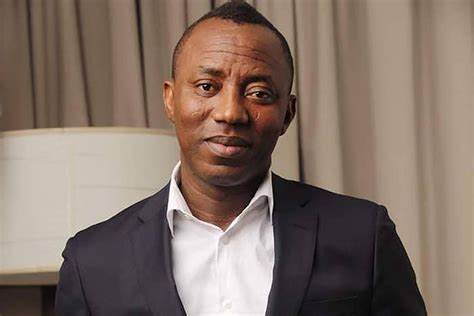A Federal High Court has set September 15, 2025, for the arraignment of activist-publisher Omoyele Sowore and his media platform Sahara Reporters on criminal charges filed by Nigeria’s Inspector-General of Police, including allegations of document forgery and public incitement.
Inspector-General Kayode Egbetokun initiated the prosecution through a three-count charge filed under case number FHC/ABJ/CR/374/2025, accusing Sowore of fabricating official police communications and publishing materials allegedly designed to provoke unrest against the federal government.
The criminal complaint centers on events purportedly occurring in late July 2025, when prosecutors claim Sowore and his news organization conspired to forge official police documentation. The first count alleges that on July 30, 2025, both defendants “did conspire between yourselves to commit a felony to wit forgery,” potentially violating the Miscellaneous Offences Act.
A second allegation specifically accuses Sowore of creating fraudulent police wireless communications that appeared to carry the authorization of the Inspector-General’s Principal Staff Officer. This charge suggests the activist allegedly produced fake internal police correspondence for unknown purposes.
The most serious allegation involves claims that Sowore published provocative content on his social media platforms the following day. According to the charge sheet, on July 31, 2025, Sowore “did intentionally post a fake police signal and other inciting materials on your Facebook page with intention to incite members of the force and the general public to embark on a mutiny against the Federal Government of Nigeria.”
This incitement charge falls under Section 114 of the Penal Code Law, which addresses attempts to provoke rebellion against governmental authority. The allegation suggests prosecutors believe Sowore’s social media activity was designed to encourage both police officers and civilians to engage in mutinous behavior.
Wednesday’s scheduled court proceedings failed to proceed as planned due to procedural complications involving service of legal documents. Prosecuting counsel Wisdom Madaki informed Justice Emeka Nwite that authorities had been unable to properly serve the criminal charges on Sahara Reporters, which is listed as the second defendant in the case.
Madaki explained to the court that prosecution teams are pursuing alternative service methods, including publication in newspapers, to ensure Sahara Reporters receives proper legal notification of the charges. This substituted service approach becomes necessary when defendants cannot be located through conventional means.
The prosecutor’s request for additional time to complete service requirements prompted Justice Nwite to postpone the arraignment proceedings. The court granted the prosecution’s application for a new date, scheduling the matter for September 15, 2025.
The delayed arraignment means both Sowore and Sahara Reporters will have additional weeks to prepare their legal response to the criminal allegations. The September date will mark the formal beginning of legal proceedings where both defendants are expected to enter pleas regarding the charges.
Sowore, a former presidential candidate and longtime government critic, has previously faced various legal challenges related to his activism and journalism. His media platform Sahara Reporters has built a reputation for investigative reporting that often criticizes government officials and policies.
The current charges represent a significant escalation in legal pressure against the activist-journalist, moving beyond civil matters to criminal allegations that carry potential imprisonment if proven. The forgery and incitement charges could result in substantial penalties under Nigerian law.
The case highlights ongoing tensions between government authorities and critical media voices in Nigeria’s democratic landscape. The specific allegations of forged police documents and incitement to mutiny suggest serious concerns about the intersection of journalism, activism, and national security.
Legal observers will closely monitor the September proceedings to assess how the court handles the balance between press freedom and alleged criminal conduct. The outcome could have broader implications for how Nigerian authorities approach cases involving activist journalists and critical media platforms.



















